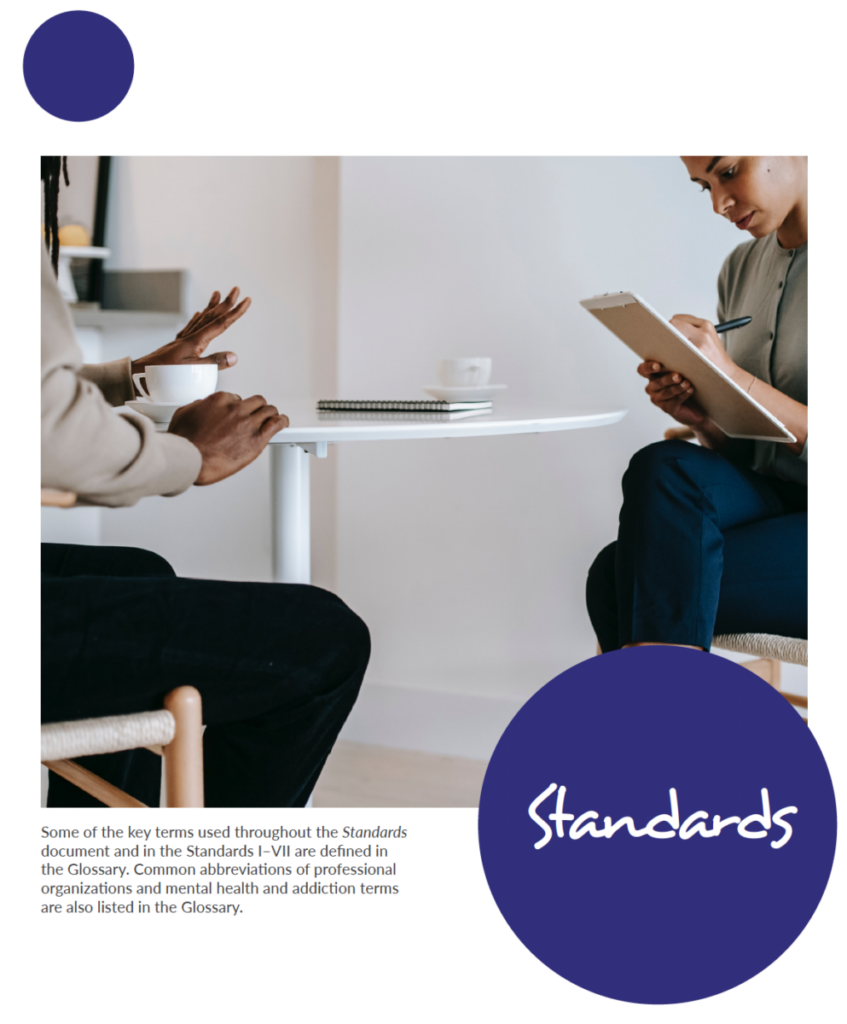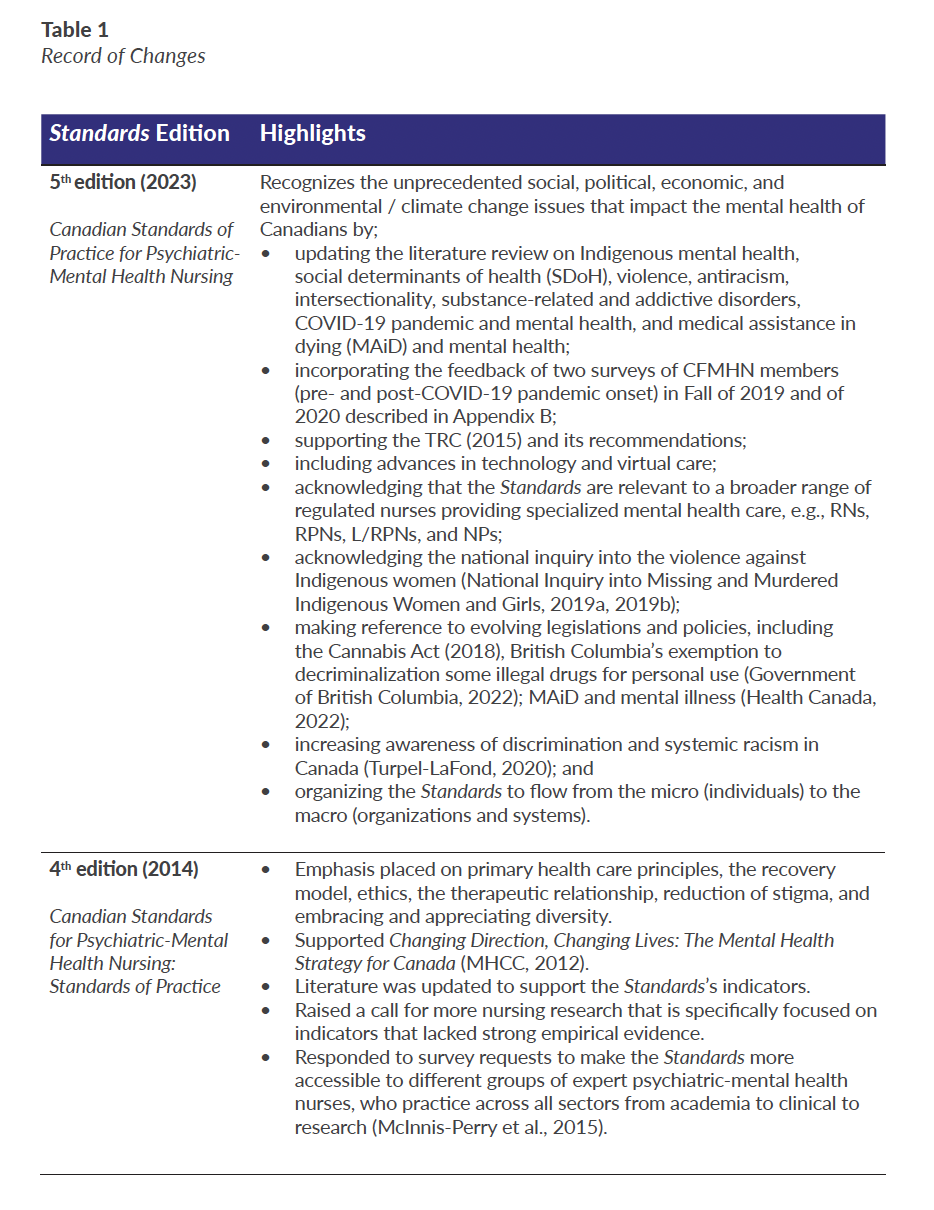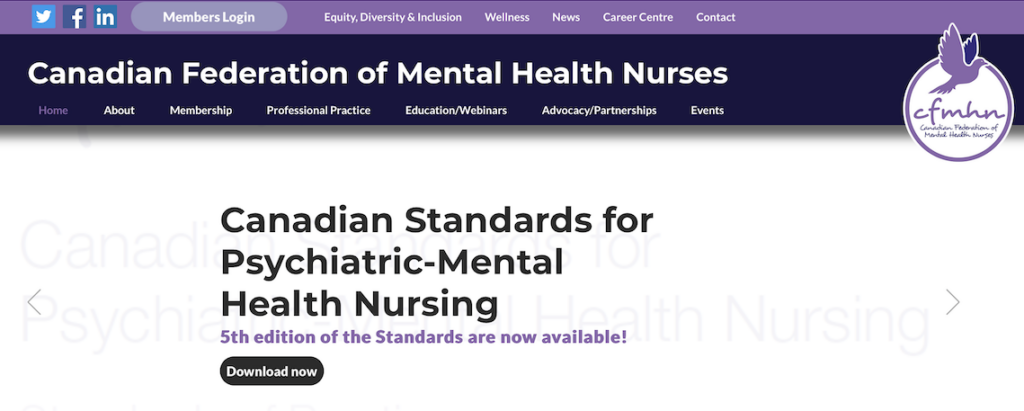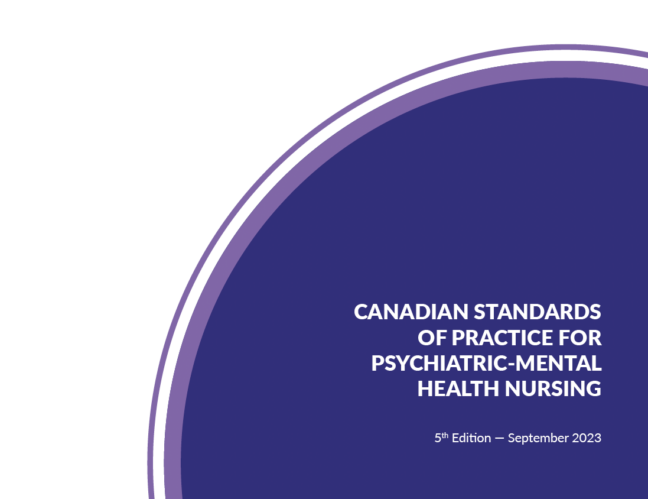Canadians recognize the critical role mental health plays in impacting well-being. Standards for mental health nursing are critical to guide practice. Revision of the Standards ensures that practice remains evidence-informed, contemporary, relevant, and responsive to the needs of individuals, families, communities, and the health care system.
This case study examines the publication of the Canadian Federation of Mental Health Nurses (CFMHN) Standards 5th edition in English and French. The publication also coincides with the new CFMHN brand and website launch.
The need for mental health nursing
Psychiatric-mental health nurses adapt to change by expanding their specialty nursing knowledge and their understanding of mental health and mental disorders while delivering competent, evidenced-informed, and safe, ethical care to Canadians.
“These CFMHN Standards 5th edition are a wonderful, outstanding legacy for our outgoing Quebec rep, Christine Genest, and her educational performance team 2023. We really appreciate the level of quality and credibility we can offer mental health nursing in Canada through your work. The Standards are well respected and well used in our field, yet this is the first AODA version and first French version.”
– Sarah Flogen, PhD, MEd, BScN, RN – President, CFMHN

Standards development
This project started back in 2019 several years before we ever became involved. The group included a core committee of five, nine contributors, and three reviewers. With each update to the Standards, the CFMHN membership had been surveyed to identify current issues and concerns. For this present 5th edition, surveys were conducted in 2019 before the COVID-19 pandemic and again in October 2020 at the emergence of subsequent waves of COVID-19. Presentations on the process of revising the Standards were made to the membership during CFMHN’s conference workshops in 2019 and 2021 and included interactive input from the participants.
Final publication process
Our engagement with CFMHN began 6 months before formal publication, and our contribution included the following aspects:
- Editing the document content and reference citations to APA 7th edition.
- Organizing applicable content in alphabetical order, specifically the list of authors, glossary items, and edited formatted references.
- Addition of a new table for the record of changes.
- Development of two appendices.
- Compiling a full list of all abbreviations that appear more than once in the Standards.
- Production for Standards in French. Editing translation into Quebec French, validation of the French, and publication. First, we translated the abbreviations, then the references, and finally, the body text. The references were edited according to the University of Montreal APA 7th edition style.
- Development of covers designed by a graphic designer and reflecting their new brand identity.
- Production of accessible Standards compliant with the Accessibility for Ontarians with Disabilities Act (AODA), 2005.
It doesn’t sound much written up as a case study; however, we painstakingly and repeatedly edited and formatted every line of these draft Standards. We created serialized queries for the committee to resolve in English. Then, once the Standards were approved in English and translated, we again created serialized queries for the committee to resolve.

Continuous improvement reflections
Several aspects of the final Standards publication warrant additional explanation:
document structure and flow–through the editing process some of the textual information was reorganized. A table was inserted to better present the record of changes in reverse chronological order across the five editions of the Standards. The glossary makes up more than half the document and uses a substantial number of direct quotes.
photography–selection of suitable photography to accompany the textual content necessitated some careful consideration. Physical touch, hugs, and holding hands are not practices supported by the Standards for practitioners. Suitable photography that demonstrated the maintenance of personal space was necessary. Images that incorporated text were shortlisted–just breathe–yet these were discounted as they didn’t work across two languages.
French language layout–a new appreciation to ensure that lines don’t start in French with punctuation or the role of the nonbreaking space. We pay increasing attention to the formatting marks function in Word.
Side-by-side comparison–while common to many of our projects in two languages, the project was an excellent illustration of scrutinizing a hard copy of the document in the two languages and doing a line-by-line, side-by-side, page-turn comparison to ensure the same number of paragraphs, bullet points, or references between English and French.

New CFMHN brand
In parallel with the development work on the Canadian mental health nursing Standards, the Board and teams evolved a new CFMHN brand identity and website. We were able to reflect the new brand in the style of the Standards documents. Congratulations on the new look which has now been launched.

Planning for the Standards next edition
In planning ahead for the next edition of the Standards it might be prudent to:
- Start early, with a larger committee meeting monthly for about 15 months.
- Consider the balance of the document. In the 5th edition, the Standards comprise twelve of a seventy-page document. The glossary made up thirteen pages of the Standards, and the 180 references covered fourteen pages.
- Build a repository of all the references to make it more efficient for the task force to validate quotations and formulate the list of references in English and French.
The Standards 5th edition will provide a useful base format in English and French on which to work for the next edition.
“Our professional association, the Canadian Federation of Mental Health Nurses, hired Opencity Inc. to edit, translate to French, and meet accessibility standards for our updated 2023 Professional Standards. John’s regular, transparent communications regarding the status of the project, precision with translation and collaboration around image selection for the French and English versions facilitated the production of two documents that not only allow us to share standards around the country, but represent us professionally. It was indeed a pleasure to work with John and Opencity Inc. Your transparent updates were a helpful way to track the progress. I also appreciated the deeper dives into the images and translations when needed. In short, well done and, on behalf of the Board, thank-you!”
– Sarah Flogen, PhD, MEd, BScN, RN – President, CFMHN
Thank you to my team, Lisa Moulton, Valerie Chaplain, and Natasha Wilson, for their ongoing support and attention to detail. Our Opencity Inc. projects continue with the pending publication of the NSWOCC percutaneous enteral feeding tube best practice recommendations and Alberta Summit proceedings. Meanwhile, work on the 2025 ORNAC Standards (17th) edition continues. Read more here about the publication of the last ORNAC Standards.

